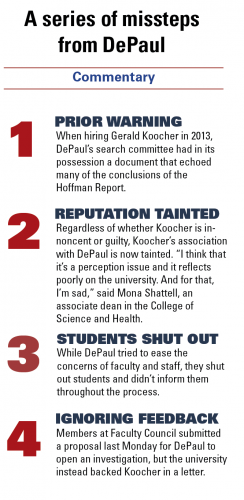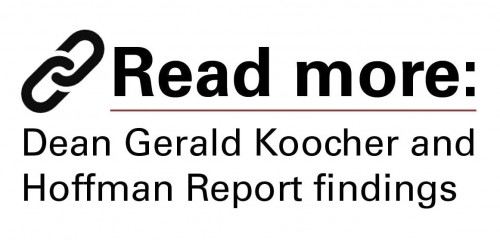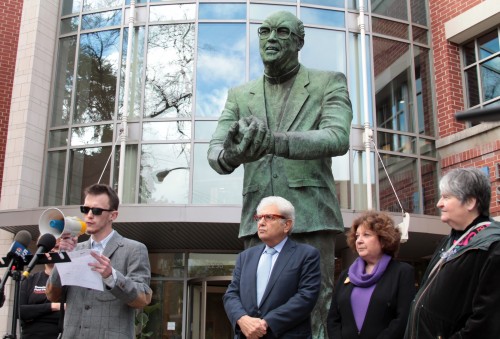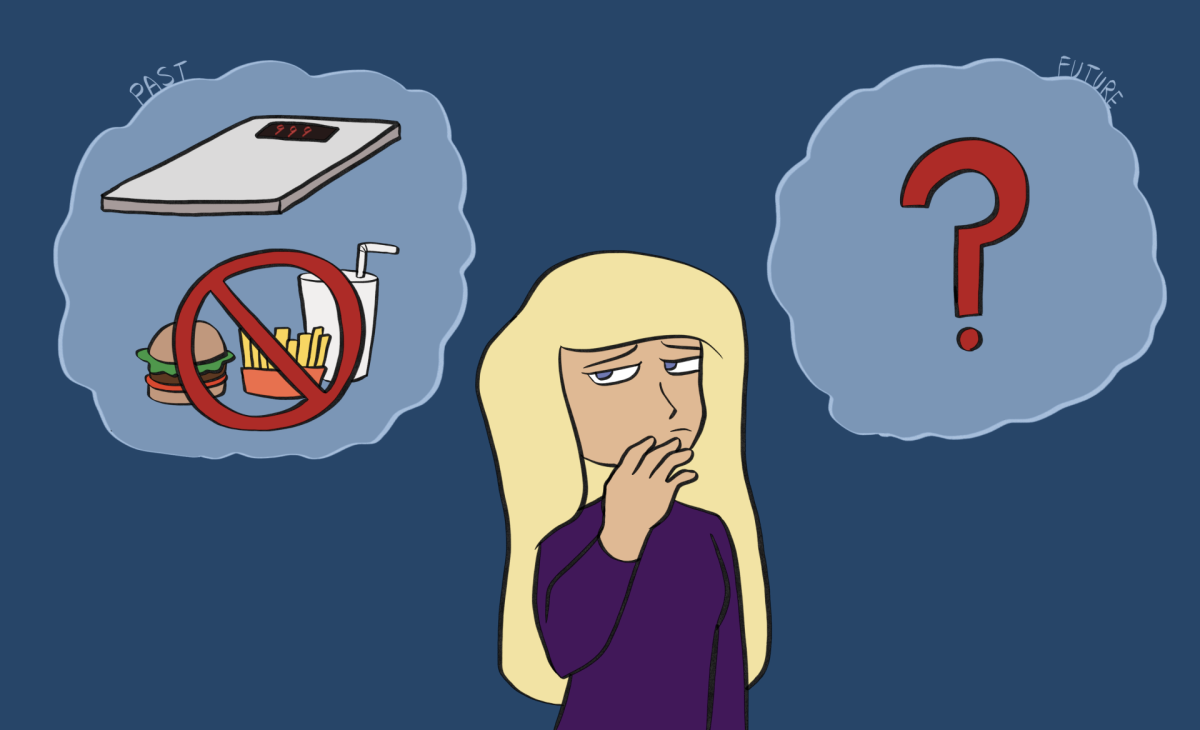
In an email to faculty and staff on Oct. 15, DePaul President Rev. Dennis Holtschneider, C.M. said he does not “share the position of some that Dr. Gerald Koocher, dean of the College of Science and Health, should be sanctioned by DePaul University for his work with the (American Psychological Association).”
While effectively and unfortunately shutting the door on possible action being taken at the university level, it seems like a fitting end for a university that bungled this matter from the beginning.
For those who have not been following the matter closely, the controversy began in July with the release of the 543-page Hoffman Report, a damning indictment of the American Psychological Association’s (APA) failures during the Bush Administration.
 In essence, the report found that the APA colluded with the government to create loose ethical guidelines for psychologists in national security situations, which contributed to torture taking place in places like Guantanamo Bay. In addition, the organization took a stance of deliberately avoiding probing into suspected torture cases involving psychologists.
In essence, the report found that the APA colluded with the government to create loose ethical guidelines for psychologists in national security situations, which contributed to torture taking place in places like Guantanamo Bay. In addition, the organization took a stance of deliberately avoiding probing into suspected torture cases involving psychologists.
During the period in question (2005 to 2007), Koocher was an APA board member, serving as president-elect and then president of the organization. He was appointed to serve as a board liaison to the task force on Psychological Ethics and National Security (PENS), the committee charged with creating ethical guidelines.
Despite only being a board liaison, Koocher took an active role in the discussion on both the first day of the task force’s sessions as well as on the group’s email listserv. According to the report, Koocher aggressively dismissed and belittled those whose opinions disagreed with his own, effectively acting as an enforcer over which ideas were discussed.
In addition, Koocher played an active role as APA president in refusing to investigate allegations of psychologists playing a role in torture. While the report acknowledged that the classified nature of such actions would have made it difficult, they noted that Koocher and APA officials did not even try to inquire in spite of news reports and rumors swirling around.
Certainly, as Holtschneider writes in his letter, most of the blame lies on an APA staff that in many cases left the board, including Koocher, in the dark.
“Unfortunately, senior staff employed at the APA concealed important information from the task force and the trustees, including conflicts of interest, delayed ethics investigations, and collusion of the senior staff with the military and intelligence agency personnel in charge of interrogation programs,” Holtschneider said.
And of course, this all happened a decade ago.
However, the university’s slow response to the serious nature of the allegations made in the report indicates an administration that is tone deaf to the concerns that have been raised by faculty, staff, students, alumni, and other members of the DePaul community.
In response to the first media inquiries on Koocher following the report’s release, a university spokeswoman said, “While DePaul has no firsthand knowledge of the matter, Dr. Koocher’s published statements are thoughtful and worth reading in their entirety.”
While hoping this would be an adequate response to the matter, it did not sit well with many in the academic community both within and outside DePaul.
 “I think the main reason the university did not want to respond to this and took a while to respond to this is because they thought it would blow over,” said senior Jack O’Brien, a leader in the Vincentians Against Torture coalition. “I think the community has come together and said that’s unacceptable.”
“I think the main reason the university did not want to respond to this and took a while to respond to this is because they thought it would blow over,” said senior Jack O’Brien, a leader in the Vincentians Against Torture coalition. “I think the community has come together and said that’s unacceptable.”
“The record is ample in the Hoffman Report. And for the school to say we don’t have firsthand information is an intellectually irresponsible position,” said Steven Miles, the chair of the Center for Bioethics at the University of Minnesota. “The information is available; the question is whether the school is going to avail itself to look at the information,” which “was obtained by a skilled prosecutor and … compulsively compiled and compulsively footnoted.”
And in a follow up story, The DePaulia confirmed that the university search committee that vetted Koocher before his hiring in 2013 had in its possession a document outlining many of the assertions later confirmed in the Hoffman Report. So, the university may not have been in the room with Koocher when the events described in the report played out, but they certainly knew of the controversy before he was hired.
The next public comments from the university on the situation would come from Provost Marten denBoer, who defended Koocher and repeated the defense Koocher himself presented in an interview with The DePaulia.
“I do think that people should be very careful to look at what was known and what was not known at the time,” denBoer said. “It’s very easy to in hindsight to look back and say, ‘well, this should have happened and that should have happened.’ The dean himself says that had he known then what he knows now, he would have done things differently.”
[box]Timeline: Controversy surrounding Dean Gerald Koocher and DePaul[/box]
A week and a half later, Vice President for Public Relations and Communications Cynthia Lawson towed the party line when asked about the controversy at a Student Government Association meeting, comparing the situation to a game of football or basketball.
“Hindsight is always great. How many of you watch football? How many of you watch basketball? Do you ever, after you watch it, the reruns, say, ‘They should have. They could have, had they done this,’” Lawson said. “But you make the decisions based on the information that you have at the time. And so if you don’t have the information, you make decisions based upon the information that you’ve got. Have you ever made a decision where you found out later, if you had additional information, you might have decided to do something different? And I think that’s what Dean Koocher would tell you.”
Yet the controversy would not go away. The serious concerns expressed during a closed-door session of Faculty Council in September led to Koocher hosting a faculty-only town hall meeting to answer further questions. Hosted by Koocher, questions were submitted in advance, which led to the environment being tightly controlled.
Due to that, a second faculty and staff-only town hall with the provost was held last week. And, of course, a coalition of students, faculty, alumni and human rights groups calling themselves Vincentians Against Torture formed a few weeks ago calling for Koocher’s ouster.
No matter one’s views on what Koocher did or did not do, this situation has become a public relations nightmare for the university — one of its own making. While the administration stood by their guy, many faculty, students, alumni and psychology professionals have called for his ouster.

“Regardless of what happened, it’s a public relations nightmare,” said Noam Ostrander, chair of the department of social work in the College of Liberal Arts & Sciences (LAS). “And when I talk to my colleagues in CSH, they’re nervous, they’re afraid, I don’t think they feel like they have the liberty to have much of a voice.”
“Faculty feel uncomfortable working with him, saying no to him and disagreeing with him,” said a professor in CSH who spoke to The DePaulia last month on the condition of anonymity. “It’s a really bad environment.”
While the university started to change its tune by eliciting faculty concerns, it did not engage the student body in any meaningful way, it took far too long to acknowledge the discontent among large segments of the population and its unquestioning defense of Koocher’s account of events show an administration not prepared or willing to address the serious allegations of the Hoffman Report.
And while it is clear that Holtschneider put a lot of thought into his remarks, some of the conclusions he came to and some of the issues left out in his argument are troubling. For instance, Holtschneider said he cannot “find a path to honor the requests that DePaul assemble a body to conduct its own independent hearing and investigation of the matter.”
This is rationalized as the university does “not have the authority to call witnesses or command evidence outside the university community, and therefore would be forced to rely on information we already have.”
Certainly, there would be limitations. But ironically enough, this is the same argument Koocher used to justify deliberately avoiding looking into cases of psychologists accused of assisting torturers at Guantanamo Bay. Much like Koocher in his role at APA, the university is effectively looking the other way when faced with serious ethical questions of one of its own.
And not even mentioned in any of the university’s responses is the issue of third-party benefice, “articulated by psychologists ranging from Jim Mitchell to Koocher, which posited that harm to one individual (a detainee) must be weighed against the benefits to third parties (the public) that would result if, for instance, information from the detainee stopped a terrorist attack.”
While perhaps an acceptable position for the government, it is morally reprehensible for an organization based in humanistic values to hold such a view.
The point in discussing these matters, despite the length in time that has passed, is that the allegations made in the Hoffman Report against Koocher are serious and warrant further investigation.
As PENS task force member Jean Maria Arrigo, the target of Koocher’s aggressive exchanges after her dissent, put it, the issue for DePaul is “how a person in an institutional position who has used those institutional positions covertly in ways that do not serve that institution and its members.”
Koocher’s alleged conduct as described in the Hoffman Report does not reflect a person with the values or judgment necessary for someone in a powerful leadership role.
“The president left out (in his letter) that Dr. Koocher actively and viciously silenced dissenting voices,” O’Brien said. “He spoke about how upper level members of the APA did that. That was Dr. Koocher. He cannot use his name. But that was Dr. Koocher’s role.”
Of course, Koocher deserves the chance to defend himself, but it cannot be and should not be on his terms as it has been for the past few months.
At last week’s town hall meeting with the provost, several faculty members proposed the creation of an “independent body by the Provost, Faculty and Staff Council, and the Student Government Association to assess whether Koocher’s various roles in the APA are consistent with DePaul’s mission and values and the stated goal of the new College of Science and Health to educate students with a strong Vincentian commitment to social justice and civic engagement.”
According to the proposal, “absent a serious inquiry conducted by an independent body representing all university stakeholders, DePaul risks being widely perceived as engaging in a ‘cover-up’ of a national scandal involving a DePaul official accused of serious ethical breaches that appear to be at odds with the university’s stated mission and CSH educational goal.”
Holtschneider’s concerns regarding an investigation are understood. However, dropping the issue completely is not a solution, it is a cop out. There are legitimate questions that must be answered and that pertain to DePaul. By opening an investigation, we may get some answers and hopefully some closure.








Steven Miles, MD, JD, M.A., PhD. • Oct 21, 2015 at 11:34 pm
I am not a man who knows a lot, but what I do know, is that if we are going to do something based off of knowledge, then we best well know it.
Jack • Oct 19, 2015 at 8:11 pm
Vincentians Against Torture Coalition’s Response
Dear Supporters,
As some of you may be aware, DePaul’s President Rev. Holtschneider, C.M., sent an email this week to DePaul’s faculty regarding his opinion of Dean Gerald Koocher and his involvement in the Psychological Ethics in National Security (PENS) task force. While I am glad that Rev. Holtschneider is commenting on this important issue to the DePaul community, he made a number of inaccurate assertions in his email about Dr. Koocher’s role and intentions at the time.
The PENS task force did not merely determine, “…that there were important, but highly limited, roles that psychologists could fill ethically in advising government and military officials.” Rather, as cited in the Hoffman Report on the PENS task force, Dr. Koocher confirmed, “that the purpose of PENS was to give ethical guidance to psychologists in interrogation settings and not to bar them entirely” (Hoffman, p. 252). In addition to psychologists having an active role in interrogation settings, Dr. Koocher attacked the very notion that the APA (American Psychological Association) should use international law in crafting ethical guidelines for psychologist in these settings, instead asserting that psychologists should be bound only by U.S law (Hoffman, p. 23).
President Holtschneider also writes, “Unfortunately, senior staff employed at the APA concealed important information from the task force and the trustees, including conflicts of interest, delayed ethics investigations, and collusion of the senior staff with the military and intelligence agency personnel in charge of interrogation programs.” What he omits, however, is that Dr. Koocher was one the APA senior leaders who recommended the APA, “…deliberately avoid probing or inquiring into the widespread indications that had surfaced about the harsh interrogation techniques being conducted by the CIA and DoD (Department of Defense), even though they knew that psychologists were involved in CIA and DoD interrogations” (Hoffman, p. 67).
In addition, when Dr. Frank Summers emailed two independent, authoritative reports confirming that psychologists were involved with torture, Dr. Koocher did not initially respond. After Dr. Summers emailed him a second time inquiring as to why he had not responded, Dr. Koocher wrote back, “Don’t hold your breath.” Dr. Koocher cannot claim to be a victim of evaluation in hindsight because his own communications illustrate his intent to obfuscate the truth, falsely uphold the APA’s reputation, and unilaterally ignore reports of psychologists involved in enhanced interrogation settings.
In addition, Dr. Koocher assumed that the APA would never have the means of acquiring hard data regarding psychologists, “…committing abuses at Guantanamo Bay, and therefore as a matter of strategy, APA should simply continue to issue public statements saying it was ‘concerned’ and would look into the matter as soon as such hard data became available (knowing that it never would)” (Hoffman, p. 216). The party line for the senior leaders of the APA, including Dr. Koocher, was to deny collusion indefinitely until it had only historical interest. As Dr. Koocher himself wrote, “Right! We should probably [r]epeat same until ‘evidence’ of anything becomes public in 2055” (Hoffman, p. 216).
Dr. Koocher and his allies want everyone to believe that they were duped or fooled, and are sincerely contrite in the face of new evidence showing the atrocities committed at detainment facilities and psychologist’s roles in these inhumane programs. They would want us to believe that they too are victims of hindsight and would have done things differently with more information. But the PENS task force email communications and the Hoffman Report clearly show that the senior members of the APA, including Dr. Koocher, intentionally ignored information on enhanced interrogation practices and psychologists roles and shot down those who dared to express outrage over the APA collaborating with the DoD. Nor did Dr. Koocher and his allies come forward with their surprise after disclosure of the Gerwehr emails, emails that were used to show that members of the APA had collaborated with the CIA and military in an attempt to legitimize the cruel interrogation of detainees, which provided the smoking gun to Hoffman.
Dr. Koocher was vitriolic and defamatory in his attempt to silence PENS task force dissenter Dr. Jean Maria Arrigo, fabricating an elaborate story about her father’s suicide and a history of mental instability in an attempt to discredit her vocal opposition to the collusion between the APA and DoD (Hoffman, p. 342). He later admitted he received false information regarding Dr. Arrigo’s father, but he did not meaningfully apologize. Regardless, his highly psychologized, personal attack on an opponent is not in keeping with a high respected ethicist and psychologist. Dr. Koocher’s past actions are not appropriate for one whose position gives him oversight over all health professionals educated at DePaul.
President Holtschneider continues with, “I am grateful the DePaul community has a heart that so immediately rises to the needs of those who are inhumanely treated in our own time. I am grateful, too, for a university community that accepted Dr. Koocher’s invitations to meet and discuss these issues at great length.” But this portrayal of the event is inaccurate. DePaul’s undergraduate students, graduate students, and alumni, especially from within the College of Science and Health, have been excluded from this vital community conversation. Many have voiced their concerns on the petition to “Strip Dr. Gerald Koocher of Deanship over the College of Science and Health”, arguing that his Deanship degrades their education, their degree, and their career prospects. Others signees feel that DePaul is failing to live up to its Vincentian mission by backing Dr. Koocher, while some even believe this is a sign from the university of tacit complicity with human rights violations.
What will happen to our university if we are rightly looked upon as hypocritical? Will undergraduates want to enroll in our College of Science and Health? Will graduate students be hesitant to apply to our university’s graduate school programs? Will our willingness to abide a Dean so heavily complicit in enhanced interrogation practices lead to a drastic drop in alumni donations? I fear that if we do not take action now, the answer to all of the above will be “yes.” And, equally concerning, will the College of Science and Health’s faculty be able to express their honest concerns to the Dean, knowing how he has treated dissent in the past? Do we want one of our colleges to be trapped in a culture of fear, intimidation, and silence? Surely, the answer is “no.”
Father Holtschneider writes of Saint Vincent De Paul’s mercy in his treatment of Abbe de Saint-Cryan, his adversary in theories of grace. And while it is true that St. Vincent did indeed defend his great intellectual adversary, it was only after he himself pursued the arrest of St-Cryan for his path of “error,” or the holding of what is false to be true. It was only after St-Cryan was held responsible for his errors that St. Vincent defended him with mercy and compassion. In this spirit of St. Vincent De Paul, who sought first accountability and then forgiveness, Dean Koocher can admit to his past mistakes and step down gracefully, preserving his storied career and illustrating his commitment to ethics as an example to the students of the College of Science and Health. If DePaul continues to defend and back the Dean, it will continue to set the wrong example for our students, graduate students, faculty, and community, and leave the Dean in a position of potential harm to DePaul as well as to the APA.
CNN recently reported on the ACLU suit on behalf of three detainees against two psychologists for their integral roles in designing a CIA interrogation program (http://www.cnn.com/2015/10/13/politics/lawsuit-cia-torture-black-sites-aclu/). Psychologists and health professionals who have been speaking out for years against this collusion have attained vindication and credibility as a result of articles in the New York Times, other reliable news sources, and the Hoffman Report. When all is said and done, DePaul will find itself on the wrong side of history if it does not change course, and this will harm our entire community.
As a preventative measure, the Vincentians Against Torture Coalition has begun vigorous pursuit of alternatives to petitioning President Rev. Holtschneider. This issue will not dissipate or simply go away, not on the international stage and not here at DePaul. Our petition, “Strip Dr. Gerald Koocher of Deanship over DePaul’s College of Science and Health,” will continue as a means to transmit information and as a tool for other members of our community to express their dissent, but is no longer the primary focus. I want to thank you all again for showing your support, almost 700 strong, and I hope you all continue spreading the word and joining us in our mission. Thank you.
Steven Miles, MD • Oct 19, 2015 at 2:09 pm
The discussion of Dr. Koocher and the American Psychological Association appears to have reached a sad denouement.
University authorities seem to being closing ranks with Dr. Koocher. They have explicitly accepted his version of events despite the exhaustive investigations and independent scholarship refuting his self-serving explanations. University authorities, without having conducted their own investigation nor seeking testimony from experts and scholars who have conducted such work, have apparently peremptorily decided that a real investigation is not indicated.
They have retreated to the repudiated excuse of “what was known at the time” despite the fact that it was the known fact of government torture that led the CIA and DoD to seek cover in a partnership with the American Psychological Association.
And so, I see a liberal college that has chosen to close its mind
I see the spectacle of a community that holds private town meetings.
I see a Vincentian college that will not visit prisoners in a spirit of being with them in their need (Mathew 25:26) as those same prisoners were betrayed by Dr. Koocher’s scorn for international law that spoke to their need for protection.
The APA’s work that Dr. Koocher supervised has been repudiated by the global community of psychologists. It has been rejected by the APA. In this context, DePaul’s officials have oddly chosen to accept that work as the product of a humane, intellectually honest psychologist. DePaul’s governance has the power to dismiss the evidence as it chooses to retain Dr. Koocher as a dean. But the choice to use that power, in this manner, on behalf of such a choice diminishes the University’s stature among the prophetic voices of the Catholic liberal arts tradition.
Steven Miles, MD
Professor of Medicine
Maas Family Foundation Chair in Bioethics
University of Minnesota
CSHAlumni • Oct 19, 2015 at 2:04 pm
Dean Koocher is a disgrace to his university and his profession. I know that no alumni contributions will be coming from me as long as DePaul keeps this albatross onboard.
Jack • Oct 19, 2015 at 4:57 pm
Thank you, it would be great if you could tell all your alumni friends to do the same and let the University know your reason for no longer contributing. This isn’t over yet.
NotSurprised • Oct 19, 2015 at 1:53 pm
DePaul University: Vincentian, but only when we have to be
DPU Alum • Oct 19, 2015 at 9:50 am
It seems that the administration is more concerned with this “going away” than the negative repercussions of employing a person accused of these wrong doings.
The administration also seems to think that any investigation into these alleged wrongdoings necessarily requires the type of burden of proof used in the justice system and a process that follows accordingly. This is misguided. We only need to look as far as our mission statement and the Hoffman Report to find out whether or not the dean is suitable for his position. Yes, I agree with Fr. Holtschneider: it is hard to imagine DePaul conducting a more thorough investigation than the Hoffman Report. So, let us take the findings of the Hoffman Report (in their entirety, not selective passages) and measure them against the mission and values of DePaul and of CSH.